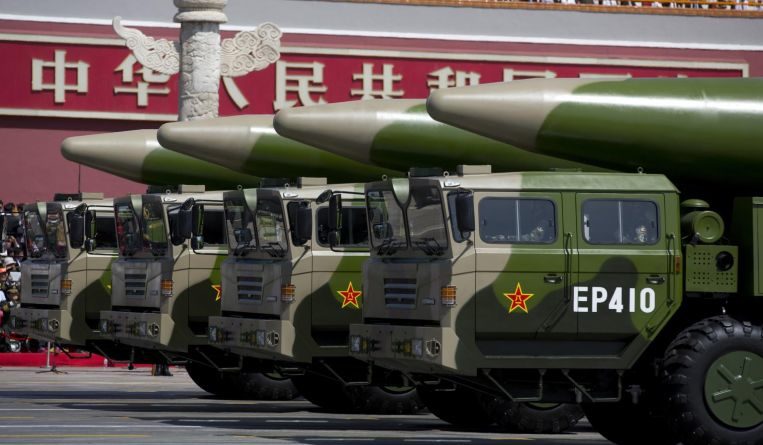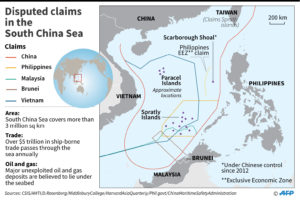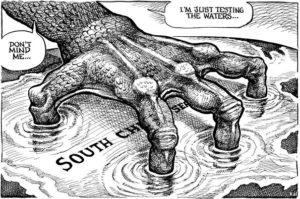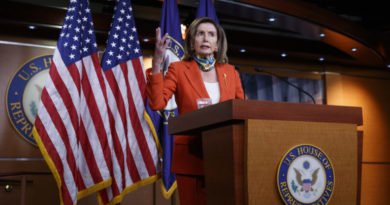THE DAILY PLANET: SOUTH CHINA SEA- Beijing fires missiles: Manila continue patrolling the Spratlys: War China vs. U.S.A.?
NEW YORK (BLOOMBERG) – US-China tensions over the South China Sea escalated on Wednesday (Aug 26) with Beijing firing four missiles into the disputed waterway and the Trump administration strengthening action against companies that helped set up outposts in the region.
China launched four medium-range ballistic missiles into the South China Sea on Wednesday amid broader military exercises by the People’s Liberation Army, according to a US defence official who asked not to be identified.
The missiles landed in the sea in an area between Hainan Island and the Paracel Islands, the official said. The move came a day after Beijing protested a flyover by a US spy plane.
Separately on Wednesday, the US announced trade and visa restrictions on 24 companies for their efforts to help China “reclaim and militarise disputed outposts” in the contested maritime area, according to a statement from the US Department of Commerce.
Among those on the list were units of state-owned China Communications Construction Co, one of the largest builders of projects in the country’s “Belt and Road” initiative.
Guangzhou Haige Communications Group Co, which makes digital communication and global positioning system gear.
“The United States, China’s neighbours, and the international community have rebuked the CCP’s sovereignty claims to the South China Sea and have condemned the building of artificial islands for the Chinese military,” said Commerce Secretary Wilbur Ross, using an abbreviation for the Chinese Communist party.
“The entities designated today have played a significant role in China’s provocative construction of these artificial islands and must be held accountable.”
The escalating tensions come as the Trump administration is trying to push back against what the US sees as an intensifying Chinese campaign to dominate the resource-rich South China Sea and smaller nations in the region.
President Donald Trump has made taking a tougher stance on China a key element of his re-election campaign against former vice-president Joe Biden, even as the two nations seek to sustain a “phase one” trade deal reached early this year.
In a related statement, Secretary of State Michael Pompeo said the US “will begin imposing visa restrictions on People’s Republic of China individuals responsible for, or complicit in, either the large-scale reclamation, construction, or militarisation of” South China Sea land.
A senior State Department official, speaking to reporters on customary condition of anonymity on Wednesday, said the visa restrictions were the “mere start” of what could be more US action to punish China over its reclamation work in the South China Sea. The official encouraged other countries to take similar measures against the people who were targeted to make it even harder for them to conduct business abroad.
The US moves should be understood in China as politically motivated due to the looming November presidential election, said Mr Wang Huiyao, an adviser to China’s Cabinet and founder of the Centre for China and Globalisation, noting that businesses on both sides are desperate to keep working together.
“China doesn’t need to respond to that,” he said.
Reversing a previous position, the administration last month for the first time explicitly rejected China’s expansive maritime claims in the region, and it has pressed allies in the region to take a stronger stance.
Earlier in the day, Vietnam called on China to cancel its drills this week near the Paracel Islands, saying they violated the country’s sovereignty.
China conducted similar missile tests in July 2019 over contested waters and islets in the South China Sea. Mr Greg Poling, director of the Asia Maritime Transparency Initiative and a fellow at the Centre for Strategic and International Studies in Washington, said the Chinese the latest move was a measured step.
“As with most of China’s foreign policy lately, it seems intended to signal strength to the domestic audience and smaller neighbours, not actually tell the US anything it didn’t already know,” Mr Poling said.
“Beijing was careful to do it within acceptable limits – firing into undisputed waters off the southern coast with due notice.”


















